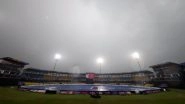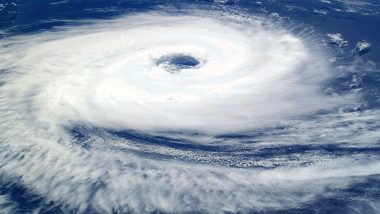Washington, July 15: Tropical Storm Barry has weakened to a tropical depression as it crossed the US state of Louisiana, heading northwestwards, although authorities are still keeping residents on alert due to the risk of flooding. The storm, which developed in the Gulf of Mexico and made landfall on Saturday in Louisiana after briefly attaining hurricane status, is moving slowly across the interior of the state at between 8-17 km per hour, Efe news quoted the Weather Channel as saying on Sunday.
Since Saturday, there has been flooding along parts of the Louisiana coastline with the water level rising between two and three feet above normal in the coastal parishes of Vermilion, Iberia and Saint Mary. Video of Gigantic Dust Storm in Rajasthan And Northern Parts of India Captured on Camera Goes Viral.
Despite the weakening of the storm on Sunday, the flooding alert remains in effect in parts of Louisiana, as well as in the states of Mississippi, Alabama, Arkansas and Tennessee. Lake Pontchartrain was one of the areas most at risk for flooding, although so far the situation has not gotten too bad and the lake has not overflowed. Mandeville city's Mayor Donald J. Villere, told Efe news that as of 5 a.m. on Sunday his lakeside town only had one street near the shore flooded.
He also said that the storm's strong winds did not cause any damage either, and - although here and there a house's cellar was flooded - there was little else in the way of damage, adding that nobody had to be evacuated from their home and the electricity did not go off. Although there had been little damage in Mandeville, Villere was being cautious and advising local residents to remain in their homes.
Louisiana Governor John Bel Edwards on Twitter repeated his recent call to the public to exercise caution, noting that state residents still have several hours of rain ahead, with the possibility of tornadoes and other severe weather conditions. Currently, there are some 126,560 local residents without electric power in Louisiana, according to the latest figures provided by the Poweroutage.us Web page.
One of the power companies operating in the state, Entergy Louisiana, reported on its Twitter account that 65,000 of its customers were without electricity and that total had risen to nearly 85,000 at Barry's worst moments. The National Hurricane Centre said that the main threat of the storm at this point is intense rain and possible flooding in Louisiana and up into the Mississippi River valley.
Authorities so far have not reported any deaths or injuries from the storm, although the material damage has been put at billions of dollars. AccuWeather estimates that damage and economic losses from Barry ultimately will total between $8 billion and $10 billion. Before making landfall near Intercoastal City, Louisiana, Barry briefly became a Category 1 hurricane, the first of the Atlantic hurricane season, only to weaken to a tropical storm.
The storm is presently packing maximum sustained winds of 56 kph, is moving north at 9 mph and is expected to reach Arkansas on Monday. The Atlantic hurricane season officially began on June 1, but on May 20 a subtropical storm dubbed Andrea developed south-southeast of Bermuda, quickly weakening and causing no damage.
The current forecast by Colorado State University, released last week, is that this Atlantic hurricane season will see an "average" number - 14 - tropical storms, six of which will become hurricanes. In 2005, Louisiana was walloped by Hurricane Katrina, which killed more than 1,800 people, mostly in New Orleans.
(The above story first appeared on LatestLY on Jul 15, 2019 12:28 PM IST. For more news and updates on politics, world, sports, entertainment and lifestyle, log on to our website latestly.com).













 Quickly
Quickly


